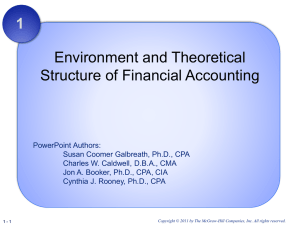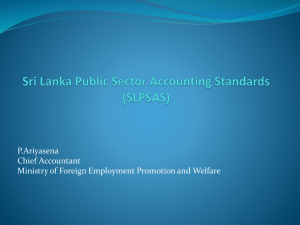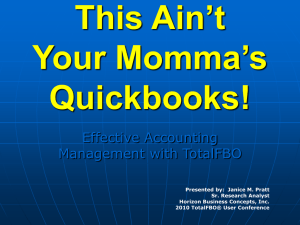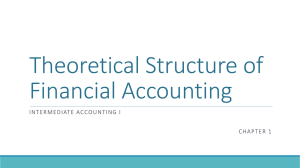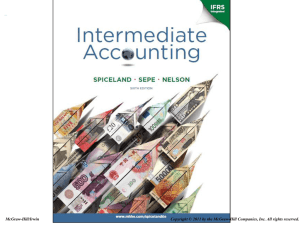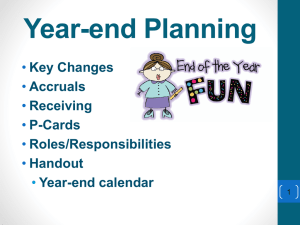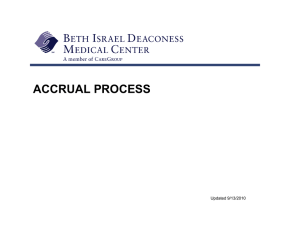Direct Payment
advertisement
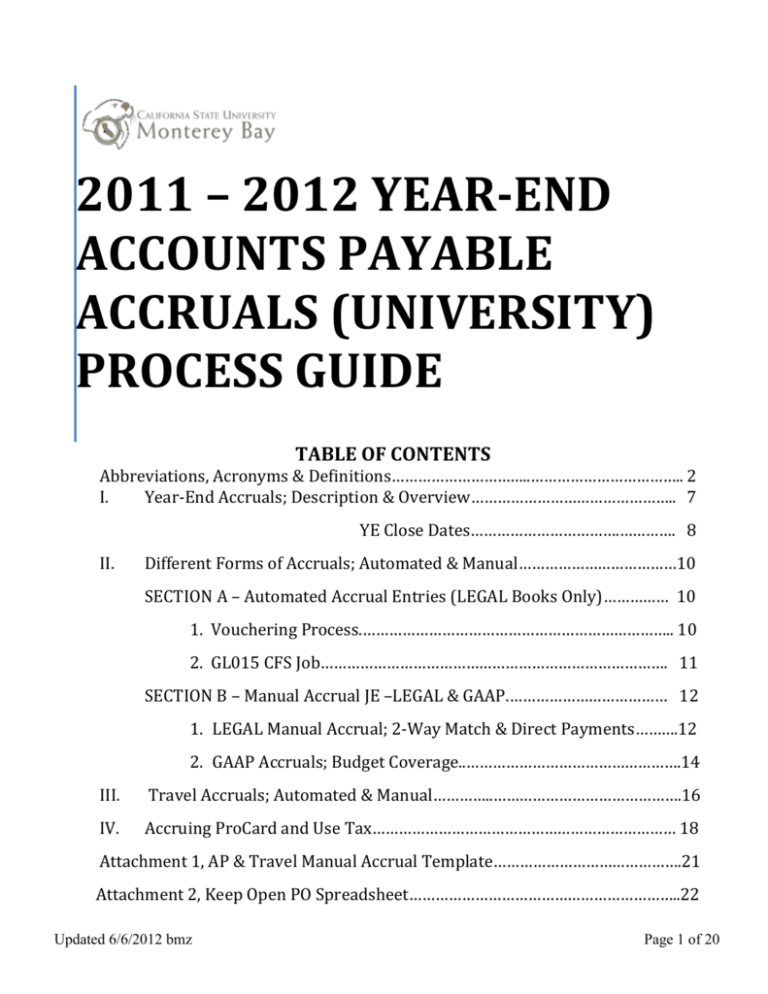
2011 – 2012 YEAR-END
ACCOUNTS PAYABLE
ACCRUALS (UNIVERSITY)
PROCESS GUIDE
TABLE OF CONTENTS
Abbreviations, Acronyms & Definitions…………………………..…………………………….. 2
I.
Year-End Accruals; Description & Overview……………………………………….. 7
YE Close Dates…………………………….…………. 8
II.
Different Forms of Accruals; Automated & Manual………………………………10
SECTION A – Automated Accrual Entries (LEGAL Books Only)…………… 10
1. Vouchering Process.…………………………………………………………….. 10
2. GL015 CFS Job……………………………………………………………………. 11
SECTION B – Manual Accrual JE –LEGAL & GAAP.……………………………… 12
1. LEGAL Manual Accrual; 2-Way Match & Direct Payments……….12
2. GAAP Accruals; Budget Coverage..………………………………………….14
III.
Travel Accruals; Automated & Manual…………..…………………………………….16
IV.
Accruing ProCard and Use Tax…………………………………………………………… 18
Attachment 1, AP & Travel Manual Accrual Template…………………………………….21
Attachment 2, Keep Open PO Spreadsheet……………………………………………………..22
Updated 6/6/2012 bmz
Page 1 of 20
FY11/12 ANNUAL ACCOUNTS PAYABLE ACCRUALS
ABBREVIATIONS, ACRONYMS & DEFINITIONS
2-Way Match Purchase Order (PO)
Requires a match between the quantity and amount on the PO and an invoice. Usually a blanket PO is used for
service contracts and does not require receiving within CFS Finance.
3-Way Match Purchase Order (PO)
Requires a match between a PO, an invoice and a receiver. The item purchased has to be received into CFS
Finance through the Receiving Department.
Account
The object of expenditure.
AP
See Accounts Payable for definition.
AP Liability
An AP liability created when the Accounts Payable Department vouchers an invoice into CFS Finance, Accounts
Payable module. This liability account number begins with a ‘2’. The liability is cleared when a check/ACH payment
is processed, completing the payment process.
Accrual
An event that is included on the accounting records regardless of whether any cash changed hands. A fiscal
recording of items pertaining to a current period which would not have appeared on the General Ledger until a future
period in the normal course of payment or receipt of the items.
Accrual Basis (Method)
A method of reporting income when it is earned and expenses when incurred, even though they may not have been
received or actually paid.
Accounts Payable
AP – List of debts currently owed i.e. services, inventory and supplies. As noted below in the accrual definition, a
purchase is recognized when it occurs, and as the payment will take place and be recorded at a later date, it is kept
track by entering the transaction into an A/P area (also known as a subledger, or in computerized terms, module).
Also a term used to refer to the accounting department area responsible for making payments.
“Actuals” Ledger
See LEGAL Ledgers for definition.
Balance Sheet
also called the statement of financial condition. This financial statement discloses the assets, liabilities, and equities
of an entity at a specified date in conformity with generally accepted accounting principles (GAAP) for governmental
accounting.
Budget
A financial plan that estimates the costs of conducting future activities.
Budget Adjustment
The act of amending the budget by moving funds.
Updated 6/6/2012 bmz
Page 2 of 20
Budget Balance Available (BBA)
The remaining amount available after allowing for all funds disbursed or obligated to be disbursed against the
budget for a particular cost center.
Capital Asset
A capital asset is defined as real or personal property that has a unit acquisition cost equal to or greater than $5,000
and an estimated life greater than one year. Note: Demolition of buildings is not considered a capital asset. See
Business and Support Services website, http://finance.csumb.edu/property-department for more information on
property.
Cash Basis Accounting
A major accounting method that recognizes revenues and expenses at the time physical cash is actually received or paid
out. CSUMB operates on a cash basis until fiscal year-end where follow generally accepted accounting principles. This
contrasts to the other major accounting method, accrual accounting, which requires income to be recognized in CSUMB’s
books (FYE June 30) at the time the revenue is earned (but not necessarily received) and records expenses when
liabilities are incurred (but not necessarily paid for).
Cash Management Operations
CMO - Department at the Chancellor’s Office responsible for oversight of systemwide cash management activities
including cash planning, forecasting, transfers to/from investments, and interagency transfers.
Cash Posting Order
CPO – Transaction notice initiated by the Cash Management Operations office to transfer cash balances between or
with CSU banking institutions and SWIFT agency accounts.
CFS
Common Finance System. Replaced CMS Finance on April 1, 2011.
Chartfield String or Chartstring
Combining a series of chartfields together creates a chartstring. A chartstring is used to define, identify, categorize
and sort a transaction. At CSUMB the chartfields commonly used in a chartstring are Fund, Account, Department,
Class Code, Program Code and Project Number.
Chart of Accounts
A list of accounts in the general ledger, systematically classified by title and number, in order to be compatible with
the organizational structure of CSUMB (Stateside), and to allow us to generate the financial report we need.
CMO
See Cash Management Operations for definition.
Commodity
Any tangible good.
Cost Center
Cost pool. A distinctly identifiable department, division, or unit within the university whose managers are
responsible for all its associated costs and for ensuring adherence to its budgets but does not necessarily generate
revenue directly.
CR
See Credit for definition.
CPO
See Cash Posting Order for definition.
Updated 6/6/2012 bmz
Page 3 of 20
Credit – CR
Entries on the right-hand side of the General Ledgers. A credit transaction decreases an asset account or an
expense, and increases a liability, equity account, or revenue account.
Current Year
CY – The current fiscal year.
Debit – DR
Entries on the left-hand side of the General Ledgers. A debit transaction increases an asset account or an expense,
and decreases a liability, equity account, or revenue account.
Deferral
In accounting deferral means to defer or to delay recognizing certain revenues or expenses on the income
statement until a later, more appropriate time. Revenues are deferred to a balance sheet liability account until they
are earned in a later period. When the revenues are earned they will be moved from the balance sheet account to
revenues on the income statement. Expenses are deferred to a balance sheet asset account until the expenses are
used up, expired, or matched with revenues. At that time they will be moved to an expense on the income
statement.
Direct Payment
Payments made straight to the actual payee, without sending it through the State Controller’s Office (SCO) to pay
the vendor directly (claimable funds only) or going through Procurement to set up a Purchase Requisition.
Examples of direct payment vouchers are Personal Reimbursements, Petty Cash Reimbursements, Payment
Requests, Travel Advances and Travel Reimbursements.
Disbursement
Payments.
Disbursement Invoices
Invoices that are paid through Accounts Payable such as direct payments and invoices associated with Purchase
Orders (3-way match POs and 2-way match POs).
DR
See Debit for definition.
Encumbrance
A firm commitment or obligation placed against funds of a department, in the form of purchase orders or
agreements, to cover a later expenditure required when goods are delivered or services are rendered.
Expenditure
Expense - An account to which payment is charged.
FIRMS
Financial Information Record Management System.
FISCAL YEAR for CSUMB
FY - Pertaining to fiscal matters. The 12-month period beginning July 1 and ending the following June 30.
FISCAL PERIOD for CSUMB
The 12-month period beginning from July 1 and ending the following June 30 (crosses two calendar years).
Fund
The source of the money you are spending.
Updated 6/6/2012 bmz
Page 4 of 20
FY
See Fiscal Year for definition.
General Ledger
GL - The general ledger is where financial information from all aspects of CSUMB's business is maintained. The
General Ledger is the heart of the accounting system. Activity to the GL is visible on the Departmental Activity
Reports.
GAAP
See Generally Accepted Accounting Principles for definition.
GAAP Ledger
Accounting records kept according to GAAP (Generally Accepted Accounting Principles). The GAAP Ledgers are
not kept in business unit MB000 and therefore, departments cannot view this activity on CFS Departmental Reports
and does not affect Departments Budget.
Generally Accepted Accounting Principles
GAAP – The basis of accounting used for preparation of financial statements. Conventions, rules, and procedures
that define accepted accounting practice, including broad guidelines as well as detailed procedures. The campuses
of the CSU maintain their financial records and reports on the legal basis of accounting which varies from GAAP. In
order to prepare financial statements in accordance with GAAP, adjustments must be made to convert from the
legal basis to the GAAP basis of accounting.
GL015
A report of goods received in CFS but not yet vouchered or paid; a CFS report generated to automatically accrue at
year-end. Also known as YAOBL (Year-End Annual Obligation).
Goods
Species of Property that is not real estate.
Invoice (disbursement ~ demand note)
A request for payment (bill) from a vendor for specific materials or supplies furnished or services rendered to the
University. Disbursement invoices are invoices that are paid through Accounts Payable such as direct payments
and invoices associated with Purchase Orders (3-way match POs and 2-way match POs).
GL
See General Ledger for definition.
JE
Journal Entry – Recording of a transaction in an accounting journal. Accounting journal – book, typically to record
accounting transactions as they occur.
LEGAL Ledgers
ACTUALS Ledgers containing period 1-12 (July-June) that includes year-end accruals. Departments can view this
activity on CFS Departmental Reports.
Liability
A debt or obligation.
PFA
Plan of Financial Adjustment – Allows agency to pay out of one appropriation and then identify costs properly
belonging to other appropriations. The State Controller transfers these expenditures from the originally charged
appropriation to the alternately charged appropriation upon request by the campus or CO (TC-36).
Updated 6/6/2012 bmz
Page 5 of 20
Prepaid Expense
A type of asset that arises on a balance sheet as a result of CSUMB making payments for goods and services to be
received in the near future. While prepaid expenses are initially recorded as assets, their value is expensed over
time as the benefit is received onto the income statement, because unlike conventional expenses, the business will
receive something of value in the near future. In short, amounts that are paid prior to the period they cover. Such
expenses can include insurance, rent, telephone bill, utilities and travel.
Prior Year
PY – The prior fiscal year.
PPY – The prior, prior fiscal year.
Purchase Order (PO)
Written sales contract between buyer and seller detailing the exact merchandise or services to be rendered from a
single vendor. It will specify payment terms, delivery dates, item identification, quantities, shipping terms and all
other obligations and conditions. Purchase orders are generally preprinted, numbered documents generated by the
buyer's financial management system which shows that purchase details have been recorded and payment will be
made.
Receipts
Cash received.
Receiver (Packing List/Slip)
Statement of the contents of a shipment, usually attached to the container so the quantity of merchandise may be
counted by the person who opens the container.
Restricted Funds
Funds, the use of which must be made in accordance with restrictions, directions, or instructions placed on them by
donors or outside entities.
Reverted Funds
Funds remaining in an appropriation at the end of the liquidation period that are automatically returned (reverted) to
the source appropriation. Reversion of funds may occur prior to the expiration period by Public Works Board action
or by legislation.
Sensitive Equipment
Sensitive property items are defined as highly desirable and portable items (e.g., computers, digital and video
camera equipment, Personal Data Assistants, televisions, VCRs, cell phones, kindles, I-pads, all similar electronic
items, etc.) It is highly recommended that departments with theft sensitive property valued less than $1,000 record
the receipt of these items. The make, model, serial number, value, vendor, should be noted and recorded in
departmental records and information furnished to the Department of Business and Support Services – Asset
Management. Items costing between $1,000 and $4,999.99 will be bar coded and tracked by Asset Management,
but will not be capitalized for accounting purposes. Any sensitive equipment that is taken home, to conferences,
etc. from the work place, requires an off campus office permit. See Business and Support Services website,
http://finance.csumb.edu/property-department for more information on property.
Vendor
An individual, partnership, or corporation that sells something or charges for a service.
Voucher
Documents a liability and provides authorization to pay the debt.
Vouchering term as used by the CSUMB Accounting Dep’t, AP has entered an invoice into CFS Finance, Accounts
Payable module.
Year End
YE – FYE (for year ending) 06/30/XXXX.
Updated 6/6/2012 bmz
Page 6 of 20
More abbreviations, acronyms & definitions are available on the Accounting website at http://finance.csumb.edu/glossary .
I. YEAR-END ACCRUALS – DESCRIPTION AND OVERVIEW
Within this guide the term ‘invoice’ is used generically and it includes personal reimbursements, payment requests and
vendor invoices/billing; direct payment and disbursement invoices. The ‘AP & Travel Manual Accrual Template’ is also
referred to as ‘Accrual Template’ within.
Expenses incurred, meaning that the goods or services have been received prior to year-end
(including Travel), are required to reflect as expense for that year. Through the voucher/payment
process an expense will reflect on the ledgers. Placing an expense in the fiscal year it incurred may
require special processing. Whenever possible, the expenses should be recorded in CFS LEGAL
books (period 1-12) prior to the close. If that is not possible, the expenses should be recorded in the
CFS GAAP ledger (period 998 also known as period 13). The instructions on how to place the
expense in the fiscal year it incurred is explained in this guide.
Accrual entries are used to record these incurred expenses. They are generally recorded as a debit to
the expense accounts with the opposing credit to Accounts Payable (AP) Liability Account (using the
full CFS chartfield string). Properly recording an accrual in the LEGAL books will help departments
avoid having to use New Year’s departmental funds to pay for Prior Year’s expenses as opposed to
the GAAP Ledgers.
Definition of an Accrual: When you hear the word accrual, try and remember the word timing! Basically accrual
means we record things as they happen, not when the cash changes hands. When an expense is incurred it is
recorded upon receipt with the date of payment being irrelevant.
The LEGAL Books, or Actuals Ledger, is represented on all of CFS Departmental Reports used by
the departments. The GAAP Ledger is not visible to the departments. It is used by the Accounting
Department for Financial Reporting purposes only. For GAAP Accruals there may be Budget
Coverage provided on MB500 funds only in the following fiscal year depending if meet eligibility
requirements. Regardless of the Fund type, all expenses where goods and services were received
by fiscal year end that has not been paid, need to be accrued in either LEGAL or GAAP prior to
closing the fiscal books.
Terminology:
The term voucher (ing) used within this Process Guide means that Accounts Payable has entered
an invoice into CFS-Finance, Accounts Payable module. By posting a voucher, the activity reflects in
the Actuals Ledgers (expenditure recorded) and offsets an AP liability in the balance sheet. Since
CSUMB pays Vendors, net 30 days, the voucher sits on the books until AP pays the invoice.
Payment of the invoice clears the AP liability and decreases Cash.
Updated 6/6/2012 bmz
Page 7 of 20
ACCRUALS MAY EITHER BE IN THE FORM OF
A. AUTOMATED ACCRUAL ENTRIES (LEGAL books only)
1. Invoice vouchered in FY11/12 by 6/30/2012 but not paid by
6/21/2012, which is the last large check run of the fiscal year.
2. Liability based on receiver which is accrued by running CFS job
GL015.
OR
B.
MANUAL ACCRUAL JOURNAL ENTRIES
1. LEGAL (Actuals Ledger)
2. GAAP (Only used by Accounting for Financial Reporting)
YE CLOSE DATES:
June 11, 2012 is the departmental deadline for approved invoices and payment requests to be
submitted and received by the Accounts Payable Department to guarantee payment by 6/21/2012.
Anything received after 6/11/2012 will be date stamped and handled in the order received. Late
submittals are not guaranteed for payment from FY11/12 funds since AP may not have time to
voucher. Depending on time restraints, AP will manually accrue into either LEGAL or GAAP ledgers.
If the GAAP deadlines are not met, then Departments risk not getting the accrual into GAAP and
possibly not receiving budget coverage.
Departments are to make sure tangible goods are received in CFS (3-way match PO) otherwise
cannot be processed by AP and will cause interruption to vouchering/paying or manually accruing.
If the June 11th deadline was not met, departments are to continue to send authorized invoices to AP
as soon as possible. As noted above, the Accounting Department will make determination on how
best to process the late arrivals upon receipt.
July 2nd from 8:00 am to 5:00 pm, departments must provide a list to AP, using the accrual
template, of expected expenses for June activities (good or services delivered on or before June 30,
2012), where an invoice from the vendor has not been received and/or has not been submitted to AP
(excluding goods received on 3-way match POs). Without meeting this deadline, the Accounting
Department cannot guarantee the posting of the requested manual accrual into the LEGAL (Actuals)
books. Send ‘AP & Travel Manual Accrual Template’ on July 2 and no sooner, if goods and services
were received by June 30th but the invoice has not been received. Departments may want to call
vendor to obtain invoice ASAP or to get the amount due to the vendor to place on the accrual
Updated 6/6/2012 bmz
Page 8 of 20
template. Otherwise the department may estimate the amount that is due but the estimate should be
close to the actual cost incurred. Do not forget to include sales tax, use tax and freight. Departments
to email this listing to AP using the ‘AP & Travel Manual Accrual Template’ (see attachment 1) with
proof goods and services have been received by 6/30/2012 (i.e. copy of packing slip). AP email
address is accounts_payable@csumb.edu. Departments to provide proof that goods or services
have been received and when received by attaching a copy of the receiver to the invoice after
tangible goods are received in CFS or any proof/verification that services have been rendered
satisfactorily such as a document stating the date service was rendered. For further instructions use
‘Departmental Receiving Requirements’ document available on the Accounting>Accounts
Payable>Procedures website at http://finance.csumb.edu/site/x5604.xml .
If the manual accrual was understated in Actuals (where amount accrued is less than actuals) then
the difference, an increase in expenditures, will be accrued in GAAP by the Accounting Department.
Departments are to notify AP when they become aware of any variances between the GL and invoice
amount.
If the manual accrual was overstated in Actuals (where amount accrued is more than actuals) then
the difference, decrease in expenditures, will be accrued in GAAP by the Accounting Department.
Departments are to notify AP when they become aware of any variance between the GL and invoice
amount.
June 29, 2012 at 2:00 p.m. is the cutoff deadline to voucher and receive into CFS. Departments to
check their CFS Departmental Reports, on July 2 (8:00 a.m. to 5:00 p.m.), to make sure that
expenditure has not already been paid or accrued (automatically or manually) by 6/30/2012 before
requesting a manual accrual.
Be careful to not duplicate an accrual by having posted into the LEGAL Books and also in
GAAP. Separate travel manual accruals from AP manual accruals (all others). Departments can
send manual accruals sooner but it is strongly recommended that Departments wait until July 2, so
that they can double check their Departmental Reports to verify the expense is not already on the
LEGAL books for FY11/12. This is to help avoid duplicate transactions.
TIMING OF ACCRUALS
June 21 @ noon
Last Large Check Run
Thru June 29 @ 2:00 pm Voucher as many invoices as possible by deadline
June 29 @ 2:31 pm
End of day cut off receiving into CFS
June 29 after 3:15 pm
Run GL015 to accrue goods rec’d on 3-way match POs
July 2 @ 5:00 pm
Cutoff LEGAL manual accrual journals from departments
July 3 – Aug 16
Updated 6/6/2012 bmz
PY expenditures paid during this time frame are recorded
as GAAP Accruals
Page 9 of 20
DIFFERENCE BETWEEN MANUAL AP ACCRUAL LISTING AND OPEN PO LISTING:
For clarification purposes: there is a difference between the AP Manual Accrual Listing that
Accounting is requesting for Monday, July 2, 2012 versus the Open Purchase Order Listing that
Procurement is requesting for June 22, 2012 from each department in order to keep Purchase Orders
from being closed on June 29. Manual accruals will not be posted unless Accounts Payable receives
the ‘AP & Travel manual Accrual Template’, and Purchase Orders (POs) will not be kept open unless
Procurement receives the completed ‘Keep Open’ purchase orders spreadsheet. These are two very
different listings, used for different purposes and processes. The ‘AP & Travel Manual Accrual
Template’ and the ‘Keep Open PO’ spreadsheet are attached for your review (Attachment 1 and 2).
They even look different.
Note: You may request that Procurement keep a specific blanket Purchase Order open by using the
‘PO Keep Open Spreadsheet.’. On this same PO you may be accruing services received against this
blanket PO by June 30 on the AP & Travel Manual Accrual template. In FY12/13 the invoice that was
accrued will be vouchered and paid against this PO that you requested to keep open otherwise
payment would not have be possible.
II. DIFFERENT FORMS OF ACCRUALS
AUTOMATED AND MANUAL
SECTION A
AUTOMATED ACCRUAL ENTRIES (LEGAL books only)
VOUCHERING PROCESS AND GL015 CFS JOB
Automated accruals occur in two (2) circumstances; 1) Vouchering Process
2) GL015 CFS Job
1.
VOUCHERING PROCESS:
Normally and automatically through the vouchering process. If an invoice is vouchered, but
the check has not been issued, the system carries the accrual. The accrual is reversed when
the check is issued, even if the dates straddle fiscal years. Thus, whenever possible, invoices
should be vouchered prior to year-end to properly account for the liability (i.e. invoices
vouchered after the check run, June 21, 2012 and until June 29, 2012 (last work day of the
fiscal year) will be accrued in this manner unless there is not enough time to process through
the vouchering process).
AP will normally only be vouchering (accruing) for services received through 6/30/2012. If
service dates straddle FY11/12 and FY12/13 on an invoice, then FY12/13 needs to be accrued
as prepaid services. FY11/12 and FY12/13 portions can be estimated. Departments can
assist by forwarding the split between the years to AP, and attach the calculations with the
invoice. For example will require a detailed telephone bill listing all phone activity; dates, times
and cost per call in order to split the activity between the two fiscal years. AP will voucher the
entire invoice but will track portion to be accrued as prepaid. A journal will be posted moving
the expense into prepaid expense (account # 107809).
Updated 6/6/2012 bmz
Page 10 of 20
Example of an automated accrual – in FY11/12 that is paid in FY12/13 (use the full CFS chartstring)
Expense
AP
Cash
________________________________
FY11/12 – AP Vouchers an Invoice
6XXXXX (Expense Account)
Debit (+)
201001 (Accounts Payable Liability Account) Credit (-)
Note the expenditure posts in FY11/12.
$100.00
($100.00)
FY12/13 – AP cuts a check in FY11/12 for the voucher entered in FY11/12
201001
(Accounts Payable Liability Account) Debit (+)
$100.00
108090
(CASH – Wells Fargo)
Credit (-)
($100.00)
Note the liability no longer exists when voucher is paid.
______________________________________
Balance:
$100.00
$0.00
($100.00)
- Payments offset encumbrances through automated process
2. GL015 CFS JOB:
If purchasing tangible goods then departments should set up a 3-way match PO, where receiving
is required, otherwise the GL015 cannot automatically accrue any receiving against this PO if not
vouchered or paid. Let the system do the work for you. Set up your PO correctly.
PO – 3- way match which requires a PO, an invoice, and a receiver that has been entered
into CFS through the Receiving Department. The PO must be created in FY11/12 by 06/21/2012.
When a receiver is recorded in CFS related to a three-way match, an accrual will be generated
at year-end for those items received on a Purchase Order (PO) but not vouchered nor paid.
The GL015 entry produces an accrual for all unpaid receivers at year-end via YAOBL
journals. GL015 process liquidates encumbrances as of 6/30/2012 in FY11/12. This accrual
entry is reversed on 7/1/2012 in FY12/13.
Tax and freight is not accrued through the GL015 process and will need to be submitted on the
accrual template if pertains and is significant in dollar amount.
EXCEPTIONS TO THE RULE due to error where automatic accrual not generated on a 3-way match PO:
i. If a three-way match PO is closed in error, it cannot be received in CFS, therefore the
department will need to notify Procurement immediately to re-open the PO. If notice PO
is closed after the GL015 job has been processed, then the department will have to
manually accrued the items received. AP will have to request Procurement to lift the
‘Receiving Requirement’.
ii. If there is an error in receiving into CFS contact the Shipping and Receiving
Department immediately to correct otherwise will not be automatically accrued through
the GL015 process. Departments will have to manually accrue if error caught after the
GL015 job is ran. Departments can view in CFS if goods have been received. Follow
the CFS quick steps on ‘CFS & Data Warehouse - Year End Resources’ available on
the Accounting website at http://finance.csumb.edu/accounts-payable.
Updated 6/6/2012 bmz
Page 11 of 20
SECTION B
MANUAL ACCRUAL JOURNAL ENTRIES
LEGAL AND GAAP
Accounts Payable will collect information to manually accrue payments for (Depts
do not place on manual accrual template; AP will process for the Depts):
Airline Tickets (BTA)
Arrowhead
Cost-Per-Click
Claims on claimable funds i.e. Capital Outlay Projects
DGS (Department of General Services Auto Rental)
Enterprise (CRBTA)
Office Max (**Send AP & Travel Accrual Template for emergency orders after May 17)
Payroll (GAAP Accrual Only except for ESF)
Procurement Card
Travel (where the RAT with travel advances have been submitted to the Travel Desk)
Utilities i.e. Central Plant requires special treatment
Unvouchered, approved Invoices sent to AP with proof of receiving
DEPARTMENTS must process all other manual accruals by sending email to AP documenting
existing liabilities (July 2) except for goods received on 3-way match POs in CFS.
**Exception is Office Max. Emergency orders after May 17 will have to be accrue on the ‘AP & Travel
Manual Accrual Template’ if not accrued by the Accounting Department.
If you know of an existing liability that Accounting should have posted by June 30, 2012 for you but it
is not reflecting in the General Ledgers, please contact Accounts Payable or the General Accounting
Manager immediately. You may have to place on the ‘AP & Travel Manual Accrual Template’ (Actual
Ledgers by 7/2/2012 and GAAP Ledgers by 8/9/2012).
1. LEGAL MANUAL ACCRUAL ( 2-WAY MATCH & DIRECT PAYMENT):
After AP stops vouchering invoices on 6/30/2012 at 2:00 pm for FY11/12, any invoices where
goods and services have been received by 06/30/2012 and the invoices have not been vouchered
into FY11/12, will be manually accrued (journal entry posted by Accounting Department) into
FY11/12 LEGAL books by Accounting Department no later than 7/3/2012.
**Office Max/Office Depot: 5/17/2012 is the last date to order supplies from Office Max for the merchant to bill
charge(s) on the last invoice of FY11/12. Please note that the order will not be billed until the order is shipped.
After May 17, refrain from placing orders unless an emergency. Departments to submit manual accrual, using
the ‘AP & Travel Manual Accrual Template’, if the emergency order is received by June 30, 2012. Verify that
the purchase has not already been expensed or accrued against your department by reviewing your CFS
Departmental Report at 8:00 a.m. on 7/2/2012. If not expensed or accrued by June 30, 2012, then submit the
manual accrual no later than 5:00 p.m. on July 2, 2012 with proof of receiving.
Updated 6/6/2012 bmz
Page 12 of 20
Listing of information required on ‘AP & Travel Manual Accrual Template’: The manual accrual
template is to be used for Travel and all other types of AP manual accruals. Separate travel accruals
from the rest by placing on a separate template (see section III on Travel Accruals). Other than travel
manual accruals, listing is to include the vendor name, description of Goods and Services, dollar
amount to be accrued (invoice amount or amount on PO for what was received by June 30 or close
estimate if invoice has not been received), purchase order number, and chart field as applicable.
Also specify if capital asset or sensitive equipment purchase (see definitions on pages 3 and 6). Also
require date goods received with proof of receiving, or contract service dates, with a copy of contract.
Listing how payment is being processed also helps AP to avoid duplication (Payment Type). See
attached sample of the ‘AP & Travel Manual Accrual Template’ (see attachment 1). Template is
either signed by the approving authority or emailed by the approving authority to AP. Departments
will email list to: accounts_payable@csumb.edu.
ADDITIONAL INFORMATION:
BUDGETARY FUNDING FOR LEGAL ACCRUALS: Besides accurately reporting the financial
results of the year and properly accruing liabilities in the LEGAL database, the accruals assist in
providing the appropriate level of budget support for the departments.
Expenses that are manually accrued at the end of the year are reversed on July 1 of the following
year in the next fiscal year. The result is a negative expense showing up in the affected department,
which results in an increase in their Budget Balance Available (BBA). Thus, when the invoices are
finally paid, the payment offsets the accrual reversal resulting in a zero net expenditure in the new
fiscal year. No Budget Office interaction is necessary to fund payments of accruals (automatic and
manual accruals in the Actual Ledgers) in the subsequent year.
Example of manual accrual (use the full CFS chartstring):
Expense
AP
Cash
BBA
________________________________________
FY11/12 – Journal Entry
6XXXXX (Expense Account)
Debit (+)
201800 (Accounts Payable Liability Account) Credit (-)
Note the expenditure posts in FY11/12.
NET BBA FY11/12
$100.00
($100.00)
FY12/13 – Reverse Journal Entry
201800
(Accounts Payable Liability Account) Debit (+)
6XXXXX (Expense Account)
Credit (-) ($100.00)
FY12/13 – Pay Vendor with Check
6XXXXX (Expense Account)
Debit (+)
108090
(Cash – Wells Fargo)
Credit (-)
Note the net effect on expenditures in FY12/13 is zero
NET BBA FY12/13
(100.00)
($100.00)
$100.00
100.00
$100.00
(100.00)
($100.00)
$0.00
_________________________________________
Balance:
Updated 6/6/2012 bmz
$100.00
$0.00
($100.00)
($100.00)
Page 13 of 20
ACTUALS ACCRUAL
TYPE
DIRECT PAYMENT
PO 2-WAY MATCH
PO 3-WAY MATCH
PO
Receiver in
CFS (Goods
& Services
received by
6/30/2012)
NO
Receiving not
required in
CFS
YES
Receiving not
required in
CFS
(Services)
YES
Receiving is
required in
CFS
INVOICE
*YES
received
by
6/30/2012
*YES
received
by
6/30/2012
NO would
be an auto
accrual if
AP has
invoice to
voucher
AUTO ACCRUAL
MANUAL ACCRUAL
*INVOICE
Vouchered not
paid by AP
Invoice not received or
submitted to AP.
Complete Template
*INVOICE
Vouchered not
paid by AP
Invoice not received or
submitted to AP.
Complete Template
Run CFS Job
(GL015) - Requires
receiver but not
invoice
PO closed in error. Did
not accrue auto.
Complete Template
In FY11/12 an encumbrance journal entry is posted by Accounting Department to decrease the
encumbrance balance for the amount of the accrual for accruals associated with a PO. This encumbrance JE
is reversed on July 1, 2012 in FY12/13.
2. GAAP ACCRUALS: Invoices that meet the criteria and should have been accrued into the
LEGAL book for FY11/12 but were not, will be recorded in the GAAP database by Accounting.
Departments will not see the GAAP accrual on their CFS Departmental Reports. Instead there
may be Budget Coverage*** provided in FY12/13 if it meets eligibility requirements.
***BUDGET COVERAGE - The Budget Office may provide additional budgetary funding in the new
fiscal year in MB500 (only) for Operating Fund expenditures that were manually accrued for GAAP
purposes. To receive funding, the accrued invoice must be paid by August 16 and if it meets
eligibility requirements. The Budget Office will provide the budget coverage subsequent to this date,
after all amounts have been verified. The Budget coverage is based on invoice amount (actual
amount paid). The Budget Department may de-allocate budget for accruals that are overstated.
GAAP ACCRUAL & BUDGET COVERAGE
NOT POSTED TO
ACTUALS
GAAP ACCRUAL
(Budget Coverage
MB500 Only)
PO
FY11/12
PO
Open
Updated 6/6/2012 bmz
RECEIVER
(Goods & Services
rec'd by 6/30/2012)
INVOICE
YES
*Approved
Invoice to
AP after
noon on
8/9/2012 up
to 8/16/2012
Page 14 of 20
*If cannot obtain invoice, but have proof goods/services received by 6/30/2012, place on “AP &
Travel Accrual Template’. Attach proof of receiving services and goods. YOU DO NOT HAVE TO
HAVE AN INVOICE IN ORDER TO ACCRUE THE ACTIVITY. YOU JUST NEED TO PROVIDE
PROOF THAT GOODS AND SERVICES HAVE BEEN RECEIVED BY 6/30/2012.
TWO DIFFERENT SCENARIOS FOR GAAP ACCRUAL AND BUDGET COVERAGE
DIRECT PAYMENT AND 2-WAY MATCH
i.) GAAP ACCRUAL & BUDGET COVERAGE –
PAYMENT REQUEST AND PERSONAL REIMBURSEMENTS (DIRECT PAYMENT)
If Goods are received and/or Services rendered by 6/30/2012, and the invoice not received and
paid by 6/30/2012 but paid by 8/16/2012, the Accounting Department will make a GAAP accrual
entry, and Budget Coverage will likely be provided through a budget transfer by the Budget Office
in FY12/13 (MB500) only if it meets eligibility requirements.
If Goods are received and/or Services rendered by 6/30/12 and the approved invoice is received
by AP between 7/3/2012 and 8/16/2012, the Accounting Department will make a GAAP accrual
entry, and Budget Coverage is likely to be provided by the Budget Office in FY12/13 for MB500
expenditures only if it meets eligibility requirements.
IMPORTANT: Departments should denote which invoices forwarded to AP in FY12/13 are to be
accrued in GAAP. This will assist AP in making the determination to accrue manually in GAAP.
ii). GAAP ACCRUAL & BUDGET COVERAGE
BLANKET PO (Purchase Order) – 2 way match which requires a PO and an invoice,
no receiver required.
The Blanket PO, no receiving required, must be created in FY11/12 by 6/21/2012. No receiver
required since only services are being rendered.
If Services rendered by 6/30/2012, and the invoice not received and paid by 6/30/2012 but paid
by 8/16/2012, the Accounting Department will make a GAAP accrual entry, and Budget Coverage
will likely be provided through a budget transfer by the Budget Office in FY12/13 (MB500 only)
only if it meets eligibility requirements.
If Services are rendered by 6/30/12 and the approved invoice is received by AP between 7/3/2012
and 8/16/2012, the Accounting Department will make a GAAP accrual entry, and Budget
Coverage is likely to be provided by the Budget Office in FY12/13 for MB500 expenditures only if it
meets eligibility requirements.
IMPORTANT: Departments should denote which invoices forwarded to AP in FY12/13 are to be
accrued in GAAP. This will assist AP in making the determination to accrue manually in GAAP.
Updated 6/6/2012 bmz
Page 15 of 20
WHAT DO I DO IFTHE ITEM WAS NOT ACCRUED IN LEGAL OR GAAP?
Budget coverage is dependent on receipt of goods and services by June 30 th. The Budget Office
has certain guidelines and restraints that they must follow. Contact the Budget Office if an item
was not accrued that meets the accrual requirements. Also let the Accounting Department know,
since unrecorded liabilities are reported to the Auditors by the Accounting Department.
WHAT ABOUT EXCEPTIONS TO THE RULES?
The Accounting Department must follow Generally Accepted Accounting Principles. There are no
exceptions to the rule according to Accounting. If you have special funding needs, then forward
your budget needs to your management, who may choose to take it forward to the Provost or
your division’s Vice-President as a one-time need from the campus reserves.
III. TRAVEL ACCRUALS
Place travel accruals on a separate ‘AP & Travel Manual Accrual Template’. Do not
mix with other types of AP accruals.
TRAVEL DEADLINES:
June 11, 2012 - Travel expense claims (TEC) for checks to be processed by June 22. This is
for travel that concluded by June 9th. Registration payment requests with payment deadlines by or
before June 30. See prepaid expense below.
Auto Accrual in LEGAL:
After June 11, 2012 continue to send TEC, where trip concluded by June 30, to the Travel
Desk. Travel accountant will accrue through vouchering into CFS.
CPO Travel Deadline:
June 11, 2012 – Deadline date to submit TEC in order to be reimbursed by CO for June 2012
travel only (Cash Posting Order {CPO} CO deadline is June 15 to be issued by July 5). Need to
use project # CHANCLOR for Travel reimbursement from the CO or other CSUs.
Travel Advance Deadline:
June 15, 2012 – Request for Approval to Travel (RAT) to Accounts Payable (advances only).
A travel advance check will be cut on June 21. Travel advances will not be processed after this
date. Travel advance check is only issued for travel commencing by June 30.
Manual Accrual in LEGAL:
July 2, 2012 - If travel concludes by June 30 but TEC not completed, submit an ‘AP & Travel
manual Accrual Template’ to manually accrue the travel expense in FY11/12. If you already
submitted a RAT for the same travel, in order for a travel advance to be processed, then do not
place on the template. Deanna will accrue the travel expense from the information on the RAT.
Be careful not to request a duplicate accrual.
Updated 6/6/2012 bmz
Page 16 of 20
If a trip straddles two years, FY11/12 and FY12/13, place the portion for FY11/12 on a
separate RAT from the FY12/13 portion of the trip (2 RATS, one trip). You will need to submit a
manual accrual for the prior year portion of the trip. Make sure you state the destination and the
date of the trip on the accrual form. Do not split airline tickets between fiscal years. Place 100%
of the airline cost on the prior year RAT. Submit one (1) TEC for the two (2) RATS after the trip
commences.
Prepaid expense – account # 107809:
If the date traveling is after 6/30/2012 it is consider FY12/13 travel. FY12/13 travel is to be
vouchered and paid in FY12/13 unless paying in FY11/12 to secure airline tickets, etc. If
vouchering or paying FY12/13 travel in FY11/12, this is recorded as prepaid travel expense in
account # 107809. In FY12/13 the prepaid journal is reversed placing the expense into the fiscal
year in which the travel occurred.
See Section IV ‘Prepayments on ProCard’ on how to handle and ‘Year-End Deferral
(University) Process Guide’ on more details on Prepaid Expenses.
Paying airfares early in order to secure economical rates, where travel commences in FY12/13, is
permissible but 100% needs to be recorded as prepaid expense. Justification is required for the
prepayment. Notify Travel Accountant of all prepaid travel since this is tracked and posted by
Accounting for year-end close.
On July 2, 2012, verify that all of your travel prepaid expenses are reflecting on your CFS
Departmental Reports. If not contact Travel Accountant.
Cancelation of trip need to notify Travel Accountant immediately so that any accruals will be
reversed. If you do not notify Travel Accountant then your departmental expenses in FY11/12 will
be overstated.
If a trip is cancelled, the traveler is also responsible for:
Cancelling or changing any travel reservations
Justification required if additional fee incurred
All refundable deposits to be returned to the university promptly
Lost refunds due to failure to act will not be reimbursed
Over accrual of travel happens when the actual expense is less than the accrued amount.
Preferably you would want to fix in LEGAL if the books are still open (up to July 2) otherwise the
variance will be recorded in GAAP. Notify Travel Accountant immediately of any variances
between accrued amount and actual amount as soon as you are aware.
Under accrual of travel happens when the actual expense is more than the accrued
amount. Preferably you would want to fix in LEGAL if the books are still open (up to July 2)
otherwise the variance will be recorded in GAAP. Notify Travel Accountant immediately of any
variances between accrued amount and actual amount as soon as you are aware.
Updated 6/6/2012 bmz
Page 17 of 20
Listing of information required on ‘AP & Travel Manual Accrual Template’:
traveler’s name
destination
date of trip
amount to accrue
how paid (payment type, i.e. BTA, CRBTA, Direct Payment (Cash), PO (2-way match or 3-way match) &
ProCard, etc.)
Template is either signed by the approving authority or emailed by the approving authority to AP.
Attach copy of TEC that has not been sent to the Travel Desk for processing if available.
GAAP:
After July 2, 2012 – Continue to forward ‘AP & Travel Manual Accrual Template’ or denote on
TEC to accrue in GAAP travel that commenced by June 30, 2012 that was not accrued in LEGAL.
IV. ACCRUING PROCARD AND USE TAX
USE TAX is assessed on tangible goods purchased from vendors that do not have a California
presence. AP can verify if a particular vendor has California presence or not.
Cash/Check Payments:
If the Department processes a manual accrual on goods that were received by June 30, 2012 from
out-of-State, then the Department must also include the use tax (budget for it), if applicable, for any
payment method used. Manual accruals should only be submitted on July 2, 2012 by the Department
for the LEGAL close. Departments are to first review their 'Departmental Report's to see if the
expense for the purchase, that they are considering to accrue manually, is not already reflecting in
the General Ledgers before submitting the manual accrual to AP for processing. If the expense is
reflecting in the General Ledgers (FYE 6/30/2012), then do not place on the manual accrual template
(the cost of the goods plus the Use Tax, if applicable). The expenditure will reflect on the LEGAL
books if the invoice has been paid or vouchered, or accrued through GL015, which is based on
receiving on 3-way match PO, or accrued manually by AP/Accounting. When AP vouchers a
payment, AP will identify and process the Use Tax at the same time, if applicable (some times this
gets missed and will need to manually accrued instead). ProCard payments are handled
differently because the supporting documentation is sent to Procurement by the Departments
not until after the ProCard billing cutoff date.
ProCard Payments:
Accruing Use Tax on ProCard Purchases after May 18:
It is the purchases through ProCard that need to be monitored very closely by Departments for Use
Tax assessment. There is almost a 2 month lag before Use Tax is identified and assessed on
ProCard purchases by Procurement/AP. Departments know firsthand if ProCard purchases they are
making are with an out-of-state vendor. Procurement and Accounting do not know this until the
support is sent to Procurement by the Departments. Departments should start tracking Use Tax for
ProCard purchases after May 18 approx. (when the May ProCard is cut off) through to June 30, 2012.
Place on the accrual template July 2, 2012 only after verifying that AP has not already accessed the
Use Tax for the ProCard activity. Only accrue the Use Tax if the expenditure for the purchase of the
goods is also reflecting in LEGAL books. The purchase and Use Tax should be posted in the same
Updated 6/6/2012 bmz
Page 18 of 20
place together, either the LEGAL books or in GAAP. If posted in GAAP, Departments will not receive
Budget Coverage for Use Tax.
ProCard cutoff is June 20:
Year-End Procurement Card Deadline: The billing cutoff date for the CSUMB ProCard is the 20th
of each month. Items must be purchased prior to June 20 and posted by the merchant to the
ProCard account by June 20 to guarantee funding from the FY11/12 budget. Cardholders will receive
an email from Procurement when the file is available for review. Last day to review ProCard chartfield
is June 26. If the deadline is missed, contact Travel desk to fix the chartstring no later than Monday,
July 2.
NEW PROCARD PROCESS for FY11/12 for ProCard purchases after June 20: As part of the
year-end process, Accounting will accrue funds for purchases charged and posted to the ProCard
between June 21 and June 28, 2012. Cardholders will receive an email from Eva Salas on June 29,
2012 to review the ProCard chartfield; otherwise AP will use the default PeopleSoft chartfield string.
Departments only have the day of the 29th to review ProCard chartfields. The activity will be uploaded
into the General Ledgers for June 30. Departments will be able to review the activity on July 2 before
processing manual accruals. Do not include any ProCard purchases on the accrual template unless
you can prove you received goods/services by 6/30/2012 but the ProCard charge was not paid or
accrued. Contact the Travel desk to fix the chartstring, if the deadline of June 29 is missed, no later
than Monday, July 2.
Departments are to accrue May and June ProCard Use Tax for out-of-state ProCard payments on
the accrual template if Use Tax does not already reflect in the General Ledgers for the ProCard
purchase. Accounting will not be accruing Use Tax for the departments since this information is not
available timely. It is up to the departments to calculate Use Tax and submit for accrual. Any charges
posted to the ProCard statement after June 30, 2012 will not be tracked and accrued by the
Accounting Department. If the ProCard Holder is going to be absent and cannot meet these
deadlines, then please assign someone to submit your reports in your absence. That person must
also request training and access to CFS ProCard. If the Approving Official will be absent or
unavailable, identify and obtain approval from another official authorized to approve expenses
for your department.
Prepayments on ProCard:
Departments need to be tracking prepaid expenses in ProCard for May and June because of the two
month lag before Accounting will be able to identify. Departments can email the Travel Accountant
for prepaid travel, registration (account # 660832 no training aspect and account # 660009 including
training), memberships (account # 660804) and subscriptions (account # 660804), and email
Accounts Payable on the other types of prepaid expenses that were paid by ProCard. Otherwise
Departments can wait until July 2, 2012 when AP will send out the ‘Prepaid EXCEL Spreadsheet’ for
verification to provide this information to include on the spreadsheet. Depending on the type of
activity, it will either be posted into LEGAL or GAAP.
After July 2, AP will continue to track prepaid expenses for GAAP. On August 9, 2012 a final
‘Prepaid Excel Spreadsheet’ will be sent to the Departments to verify the prepaid expenses that will
be posted into GAAP only since LEGAL is closed. This is an opportunity to identify what prepaid
expenses were not posted into LEGAL.
Updated 6/6/2012 bmz
Page 19 of 20
Justification Requirements on Processing Prepayments:
Prepayments must be justified demonstrating a significant cost benefit to the campus in prepaying,
etc. Prepayments usually have to be pre-approved by Procurement since they are contractual and
represent a commitment on behalf of the university. Exceptions include travel registration,
memberships and some types of subscriptions (only those subscriptions posted to account # 660804
named ‘membership and subscription’) since they are contractual and represent a commitment on
behalf of the university.
Updated 6/6/2012 bmz
Page 20 of 20
